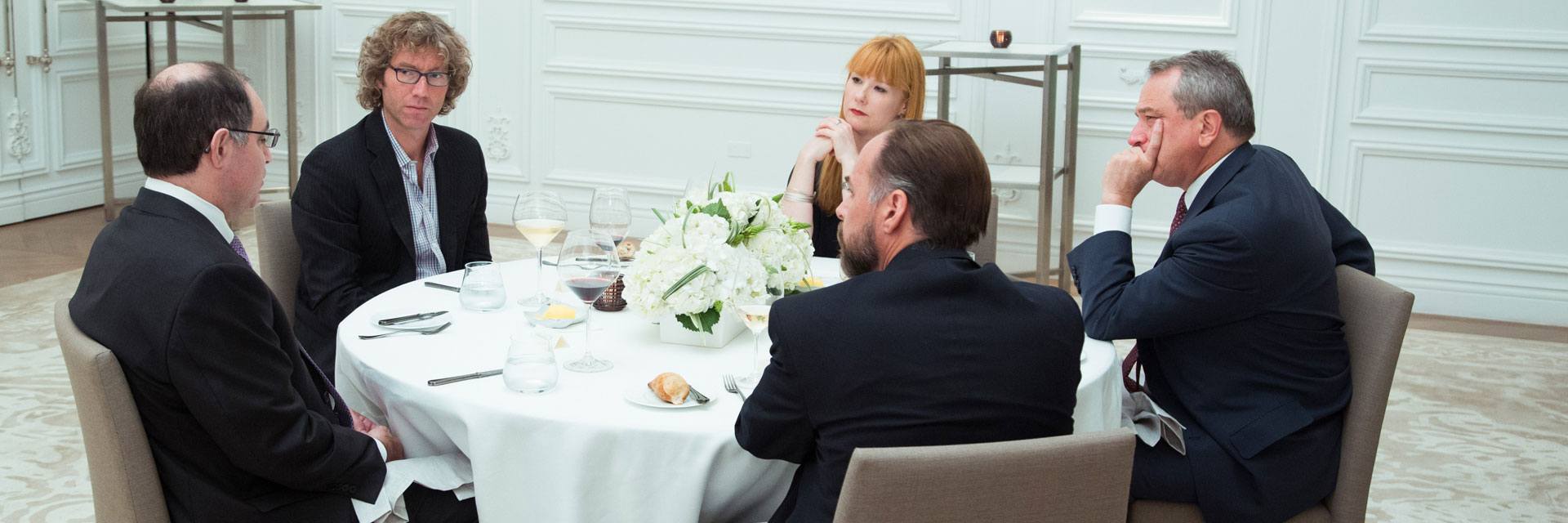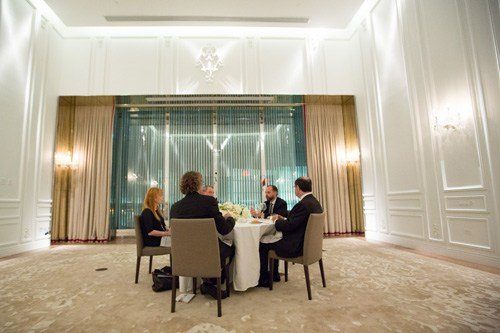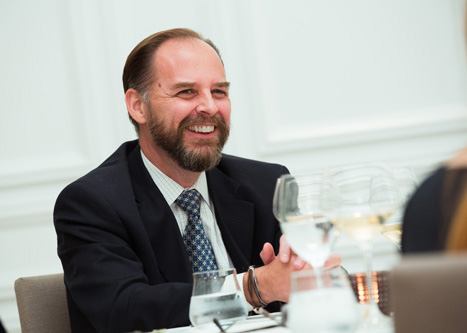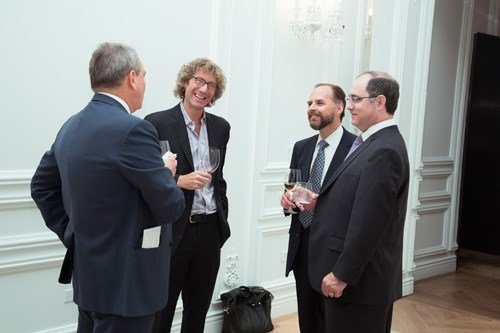Catherine McGregor (CM): What are the challenges for in-house legal departments when you’re traversing a large number of geographies and trying to communicate across a dispersed department or business?
Richard Nohe: We look at things from a number of different matrix perspectives. You have the geography or the jurisdiction, you have the line of business, then you have the subject matter expert or centres of expertise.
I think one of the dynamics that we see is: how do you balance the centre (headquarters) with the regions, or the geographies? We’ve realised that when you’re in the region, you need to have the hearts and minds of the people you are managing. And if you don’t have the HR oversight of individuals, then you need to have the subject matter expertise to interest them. We used to have solid lines going back into the centre and we shifted that so we have the solid lines going into the regions.
Ted Lazarus: Our department is structured similarly. Within regions outside the US the solid lines go within the country and within the region, and similarly the dotted lines for subject matter.
Howard Harris: We’re slightly different. We operate as one legal department worldwide, and the expectation of our lawyers is that they not only take the local country into account, but that they also co-ordinate and communicate with their legal colleagues in other markets as well. We often find issues that we think have cross-border implications, and we work through them. It’s really just a question of leadership.
Participants
Howard Harris Vice president of legal affairs and general counsel, US and Canadian BMW Companies
Ted Lazarus Director of legal, Google
Catherine McGregor Editor-in-chief, GC magazine
Richard Nohe General counsel for the Americas, BT
Allen Parker Presiding partner, Cravath, Swaine & Moore LLP
Venue
The Harmonie Room at the Baccarat Hotel, West 53rd Street, New York
CM: What are the challenges in deciding what to delegate either internally or externally?
Howard Harris: I think personally you have to hire right, and you have to make sure you get professionals in your organisation you can trust. A general counsel needs to be able to delegate. Then you can get involved on an as-needed basis. It doesn’t work if you’re too deep in the weeds on any particular issue.
Richard Nohe: If you look at risk on one axis and competitive differential on the other axis, that helps you determine what’s core and what’s non-core. The non-core, low-risk stuff is something the business can do on its own. For the non-core high risk, you’re going to be calling a Cravath, for example, because it’s something that doesn’t come around that often, but if it’s high risk: you’re going to want the best.
The competitive differential that is high risk is something you’re really going to want your team to focus on – major transactions, things that are repeatable and core to the business. The piece where it cuts across is where you’ve got to look at outsourcing, and then you can go to an Axiom or to some of the disruptive players in the market.
I think it’s a matter of looking at your risk profile and constantly evaluating. Repeatable stuff is fairly straightforward; you can say, ‘a deal that’s below $50 million has this sort of commercial structure, so needs to be approved by this level.’ You use that as a baseline then keep your eye on the business and see what warrants getting into more detail.
Ted Lazarus: We have a very large legal department and so we cover a fairly wide array of the issues that we expect to come up; obviously, in part utilising external counsel. But even for the groundbreaking issues we deal with, we have people who specialise generally in that broad area. If you can create effective processes and procedures for dealing with things as they arise, you can generally cover it pretty well. I think at Google we’ve done a fairly good job at establishing well-honed processes for at least determining how to staff various matters, and we make effective use of a matrix structure where there’ll be a regional lawyer involved and there’ll be a lawyer who’s an expert on the subject matter involved, depending on what the various substantive areas are.
Allen Parker: I would only add here that to the extent you find you need outside help, it’s obviously critical to find the right outside help. Our firm’s business has traditionally consisted of long-term relationships with our clients. We have found this model more fulfilling for us as lawyers, but also beneficial to the clients we serve. Because we usually have a long history with a given client, we find that we can be more responsive and efficient because the client doesn’t have to bring us up to speed on its larger strategic goals and approach to doing business. In the best cases, that enables us to be a real strategic partner with the client – a well-prepared team of professionals the client can call on for informed legal advice, and in some cases even business advice.
Richard Nohe: There are also different benchmarks and metrics you can look at. Typically, for a large global corporation, about a third of 1% of revenue is what your legal department should cost. And that depends partly what you mean by legal.
Then the other metric is the internal and external split. Typically it’s between 40 and 60%. Fortunately for us as a buyer, there is a lot of disruption in the market so you can get more for that external spend these days, especially on the stuff that the top firms don’t really want to do anyway.
CM: How much has that been beneficial to you, Allen? Has it freed Cravath up to do what it’s excellent at?
Allen Parker: In many cases, it’s taken outside law firms a while to adjust to the idea that a lot of that work can be done someplace other than in the traditional firm. But it’s a concept that can benefit everyone. As an example, we’ve seen a number of litigation matters where the document analysis is not really core to what we’re doing for the client. The document review is always important, of course, but it’s not absolutely critical in all cases that we do it ourselves. In those cases, we will encourage and work closely with the client to move that work elsewhere because it’s cost-efficient for the client and frees us up to focus on the more value-added work. But there’ll be some cases where the document analysis is so intertwined with the legal strategy that we’ll want to keep it much closer. I believe it’s driven a lot of efficiencies on our part as well, and has probably been a good thing for us net-net. But there are plenty of people who harken back to the old days.
Richard Nohe: To me it’s a compelling and switched-on proposal when external counsel comes and says, ‘look, this is how we’re going to structure it and for this piece we’ll manage it for you, but you don’t need a Cravath as such, and we will outsource this portion.’
CM: How do you stop being seen as ‘just the lawyer’? Are there times when you have to be ‘the lawyer’ to get your point across? And how do you teach younger lawyers to be part of the strategic business but also the one who has to say ‘no’ when needed?
Howard Harris: A lot depends on company culture. Lawyers need to remain independent and objective. When you understand the industry and the businesses, you’re uniquely positioned to help the company achieve its goals and, over time, trust and respect develop. When you have that, it gives you and the lawyers more opportunities to affect the future. It’s the difference between telling people what they want to hear and what they need to hear, and I think in-house lawyers need to tell the clients what they need to hear, whether or not they want to hear it. You have to respect the line that exists.
Richard Nohe: You have to understand the business, first and foremost. If you do, they’re more likely than not to want to consult with you to figure out how they can get it done most efficiently and quickly. If you’re looking for how you get to ‘yes’ quickly, then I think they’re likely to bring you in. You need to have a relationship with your key stakeholders so that they’re going to want you in the room, and if you’re not, then it’s a different problem than whether you’re in or out of strategy. You probably don’t have the right relationships established.
Ted Lazarus: You prove your value over time. And if you’re doing your job right and helping them get to ‘yes’, and you’re adding value to the process of figuring out how to bring in revenue responsibly and how to develop innovative products while minimising risk, then they’re going to want you in the room; they’re not going to see you as a hurdle.
CM: How difficult is it to encourage the team to think strategically, particularly with people new to in-house?
Howard Harris: That’s the hiring process. I look for people who have a positive attitude and a great work ethic; people who are intelligent. There are some things you can’t teach. You should hire for the things that you can’t teach and then what I try to do is have the newest lawyers take on a variety of different responsibilities to give them a broad overview of what the company is about. In that way, I can accelerate their learning curve and enable them to be that much more productive, and eventually they’ll settle into what they need to do. But the more suited they are to the company culture and the industry, the better off I think they are in terms of helping the company.
Ted Lazarus: We spend a lot of time discussing what makes a successful lawyer at Google, and many of the principles that we were just talking about – not being the department of ‘no’, learning how to foster innovation while bringing in revenue responsibly – are things that we drill home repeatedly. We evaluate performance based on those criteria. If someone comes in and they are not a good partner to the business, we’ll hear about it from our product managers, our sales people, our engineers, and we will act on it. We take it very, very seriously.
Allen Parker: For us, the starting point in terms of what makes a successful lawyer is what we would call judgement: the ability to understand what’s important and what’s not. Whenever we’re approaching something that involves the interface of a younger lawyer with a client, we want to make sure the young lawyers understand the business and what the goals of the business are. They have to be really good listeners, not afraid to ask questions in the right context and, as said before, not afraid to say ‘no’ when they should.
Over my career as a transactional lawyer, one of the things I’ve seen as problematic in many situations is where you can tell that one side of the transaction isn’t hearing what the other side is saying, whether on legal issues or business issues; they’re talking past each other and they don’t realise it. I think the best outside lawyers will be very attuned to the question of whether they’re actually communicating and moving towards a common goal, and then mediate whenever necessary. And it’s the same for people who are in-house.
CM: Do you think the function of the in-house lawyer has changed dramatically? Is the in-house role becoming more strategically focused?
Richard Nohe: The legal risk and the regulatory environment and everything has fundamentally changed. I think lawyers and legal departments are in a position where everything is moving towards a very technological base, and the law has not kept pace with that. It’s really a question of how do we advise corporations as to what they should be looking at from a legal perspective, and how is technology changing that? I don’t think we’ve really done enough in the profession to drive that dialogue. We tend to be a very reactive profession. We should be much more proactive.
Howard Harris: I think that leaders lead. I’ve been in-house my whole career and I’ve seen people who are very good at leading, and some people not so much, and I really think that is one of the keys to how to maximise value of an in-house legal department.
Richard Nohe: More and more you’re seeing COOs of legal departments. We have a COO, and you have to be able to manage the department through KPIs and through financials, showing the management, the CFO, that you’re also being efficient and effective.
CM: What do you think is the difference between in-house and external counsel with regards to risk appetite?
Allen Parker: It’s a gross generalisation, but in my experience, outside counsel tend to be more risk averse. I think some of that comes from the simple reality that no matter how close they are to the business, outside counsel don’t always understand the business imperatives and strategy as well as those people who are at the company. And that’s why it’s beneficial to use outside counsel who have come to know the company and its business goals well over time.
Allen Parker: We teach our young people very early on that they have to recognise that they’re in a service role and not the ultimate decision-maker. As outside lawyers, we help identify risk and help mitigate it, but the company’s appetite for risk is a question for the client, including the in-house lawyers.
Howard Harris: I think it’s incredibly important that the in-house lawyer gives their view, because they may agree or not agree with outside counsel, but it’s an opportunity for them to get added input in terms of making a recommendation that will benefit our businesses.
Richard Nohe: Allen, I think you hit the nail on the head, because outside counsel do not have a governance function. You can’t say ‘no’ – you give legal advice; but in-house counsel are expected to say ‘no’ sometimes and they have the governance authority to say ‘no’.
Ted Lazarus: It’s interesting that when we hire people and we train them, it’s not as if a junior lawyer is going to be responsible for setting company strategy, but what we’re trying to instil in them is the attitude that they are the business, that they work hand in hand with the VP of sales and the head of product. They’re part of the decision-making body.winwinter



